The Coalition to Accelerate Access to Long-Acting PrEP is an initiative that brings together leading donors, agencies, and advocates to ensure an accelerated, equitable, sustainable and collaborative approach to making longer-acting PrEP options accessible as quickly and as equitably as possible. The Coalition is convened by Unitaid, WHO, UNAIDS, Global Fund and PEPFAR, with AVAC as the Secretariat.
Coalition to Accelerate Access to Long-Acting PrEP
Coalition to Accelerate Access to Long-Acting PrEP
The Coalition to Accelerate Access to Long-Acting PrEP brings together leading donors, agencies, and advocates aimed at a practical goal: jointly develop strategies and take coordinated action to identify and overcome access challenges to just-approved and future PrEP options. AVAC serves as the Secretariat.
What is PrEP Access Right Now and What’s Next in 2024?
AVAC is thrilled to see the launch of injectable cabotegravir for PrEP (injectable CAB) in Zambia—the first program outside of the US to do so. And the Desmond Tutu Health Foundation in South Africa recently announced “the first jab” of injectable CAB administered in its FASTPrEP study.
Webinars to Look Out for in February!
2024 is off and running and a slew of webinars are on the calendar. This selection of topics is both broad and deep, providing updates on the pipeline from cure to vaccines, insights on critical advocacy, a conversation with the new director of NIAID, and opportunities for you to engage. Scroll down for what’s coming up and recordings of webinars from December and January that you may have missed.
Coming up!
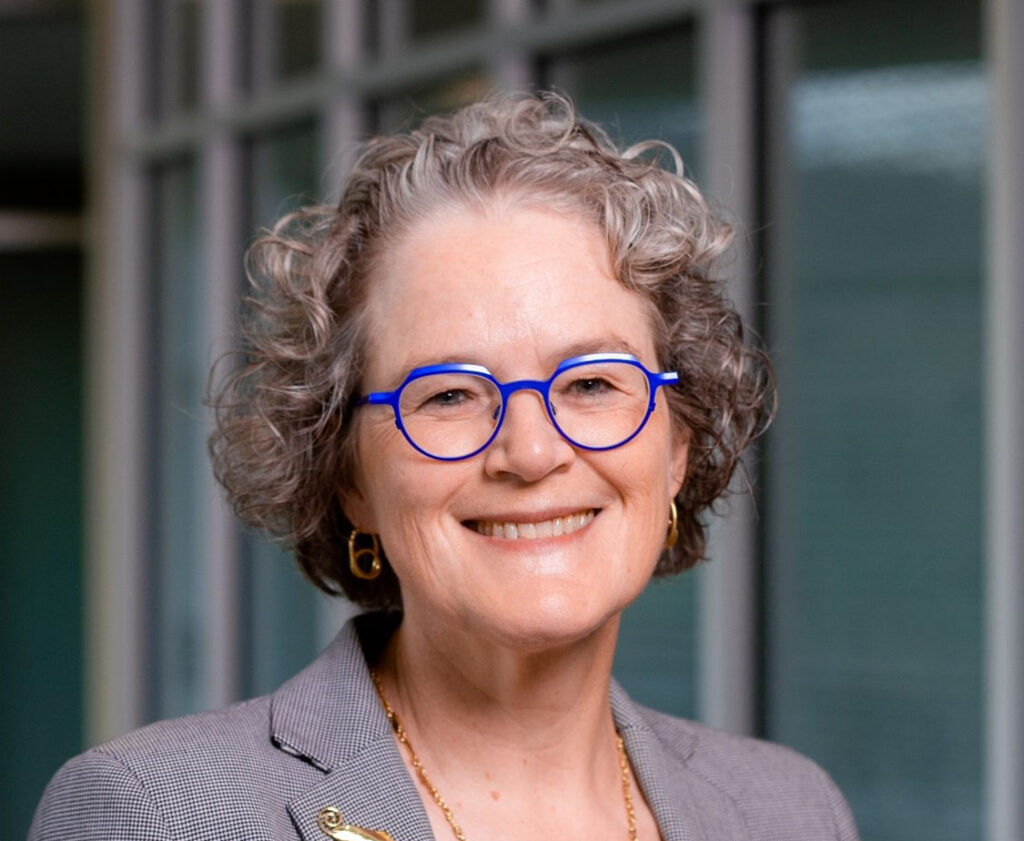
AVAC in Conversation with NIAID’s Jeanne Marrazzo
February 27, 11:30 am – 12:00 pm EST
Join AVAC in conversation with the new Director of NIAID, Jeanne Marrazzo. Register here.
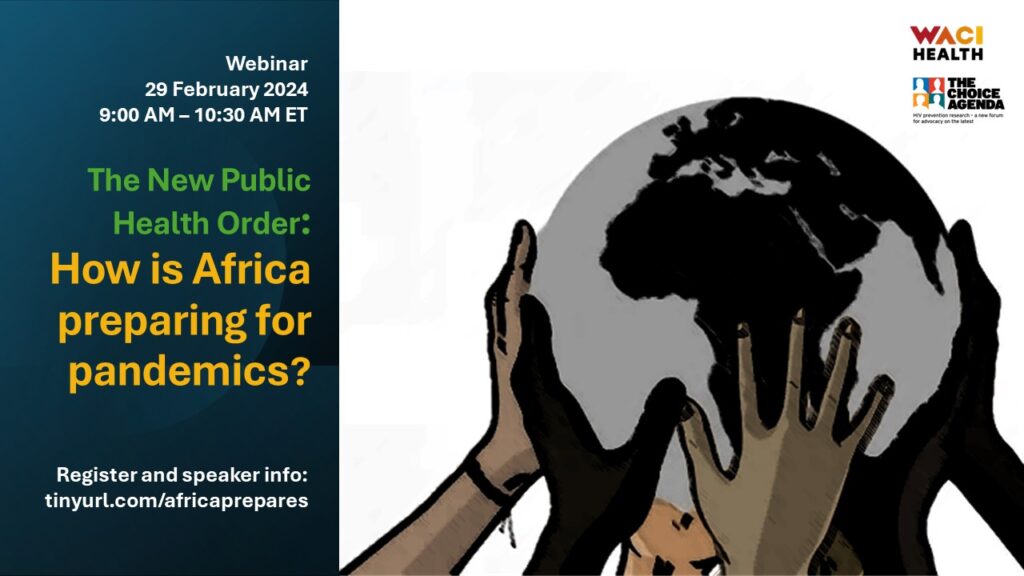
The New Public Health Order: How is Africa preparing for pandemics?
February 29, 9:00-10:30 am EST
WACI Health and The Choice Agenda invite you to join us for a webinar introducing key initiatives of the Africa CDC and the African Union. It will illuminate roles for civil society and community engagement. Register here.
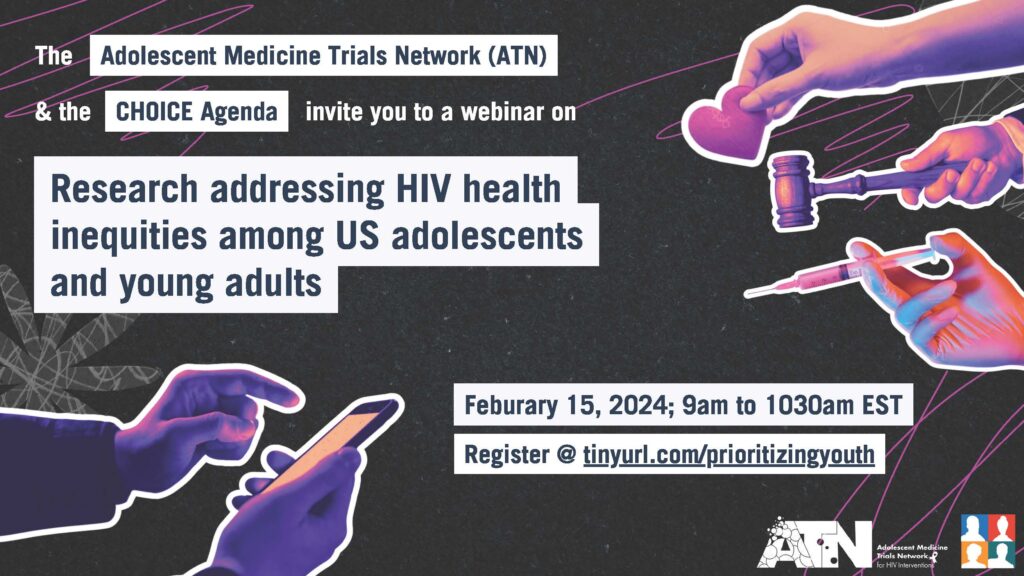
Join The Choice Agenda for an overview of the newest cycle of the Adolescent Medicine Trials Network! This webinar includes highlights of: ATN 165: Linking Youth to PrEP Services, which tests an innovative mobile delivery and mHealth intervention for PrEP adherence and persistence among sexual minority men; ATN 167: Legal, Economic, and Affirming Peer Support (LEAP) for transgender and gender diverse youth; and how the network prioritizes and amplifies the voices of youth directly impacted by the ATN’s pivotal research. Register here.
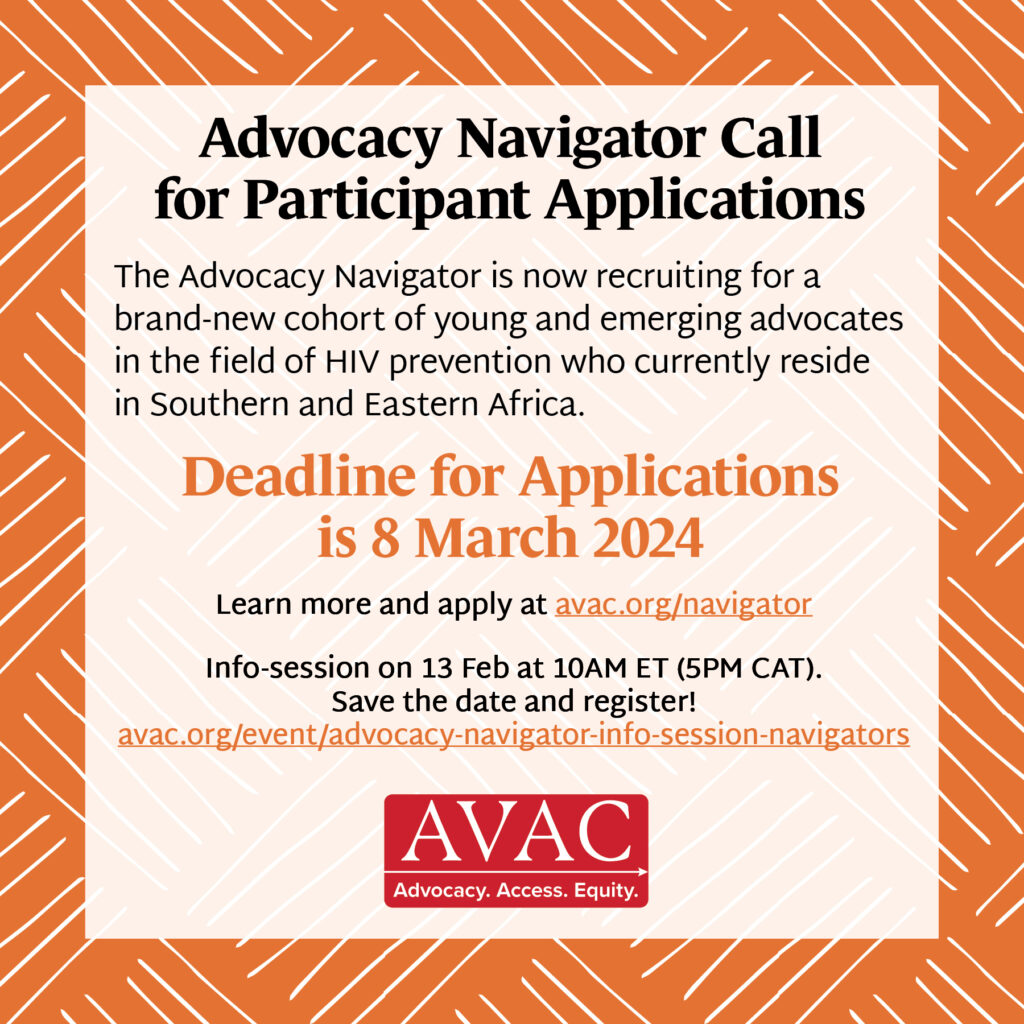
Advocacy Navigator Program Info Session
February 13, 10:00-11:00 am EST
This webinar is intended for anyone interested in applying to participate in AVAC’s Advocacy Navigator program. The session will provide an overview of the program, expectations, eligibility, and application process, followed by Q&A with the AVAC team.
In case you missed it!
Reporting the African Science Story: Decoding scientific research to support public health in Africa
Through the Media Science Café Program, AVAC partners with health media associations in Kenya, Tanzania, Uganda, Zambia and Zimbabwe to bring journalists together with researchers, implementers, civil society, policy makers, regulators and policy makers to build relationships that will foster accurate reporting of HIV, COVID and other science or health stories in those countries. Learn about the model! Recording, slides and resources.
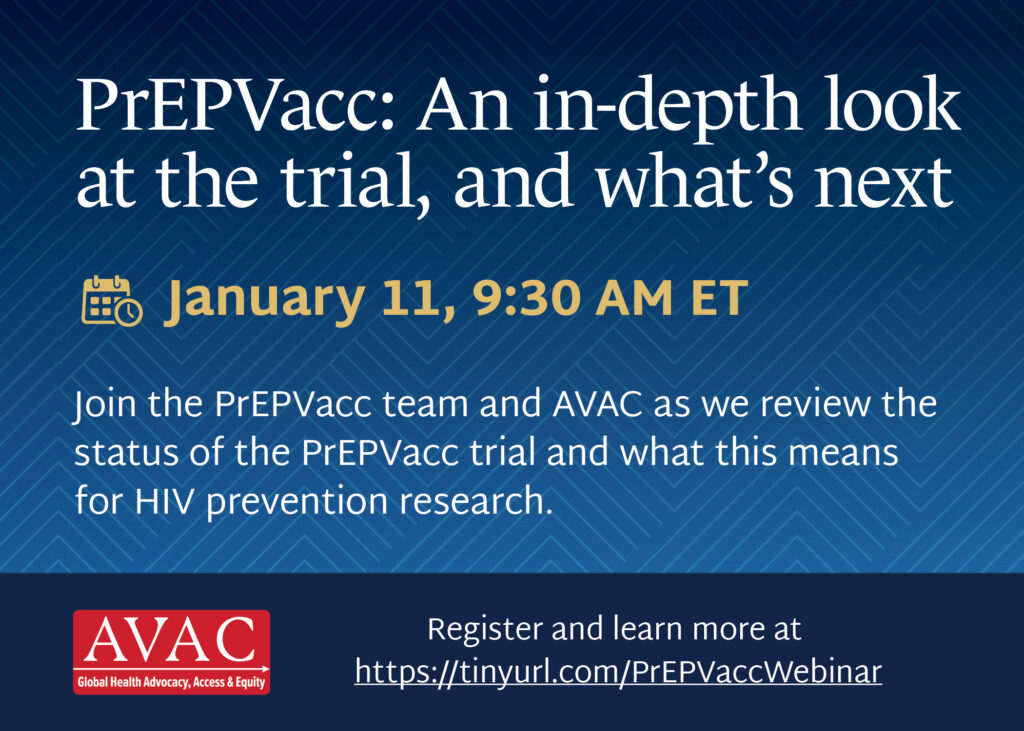
PrEPVacc: An in-depth look at the trial, and what’s next
This webinar reviewed key aspects of PrEPVacc, including its innovative study design, implementation, integrated social science, and data analysis plans. An engaging conversation about what we’ve learned from PrEPVacc, what we can still learn, and what this may mean for the HIV prevention field. Recording, slides and resources.
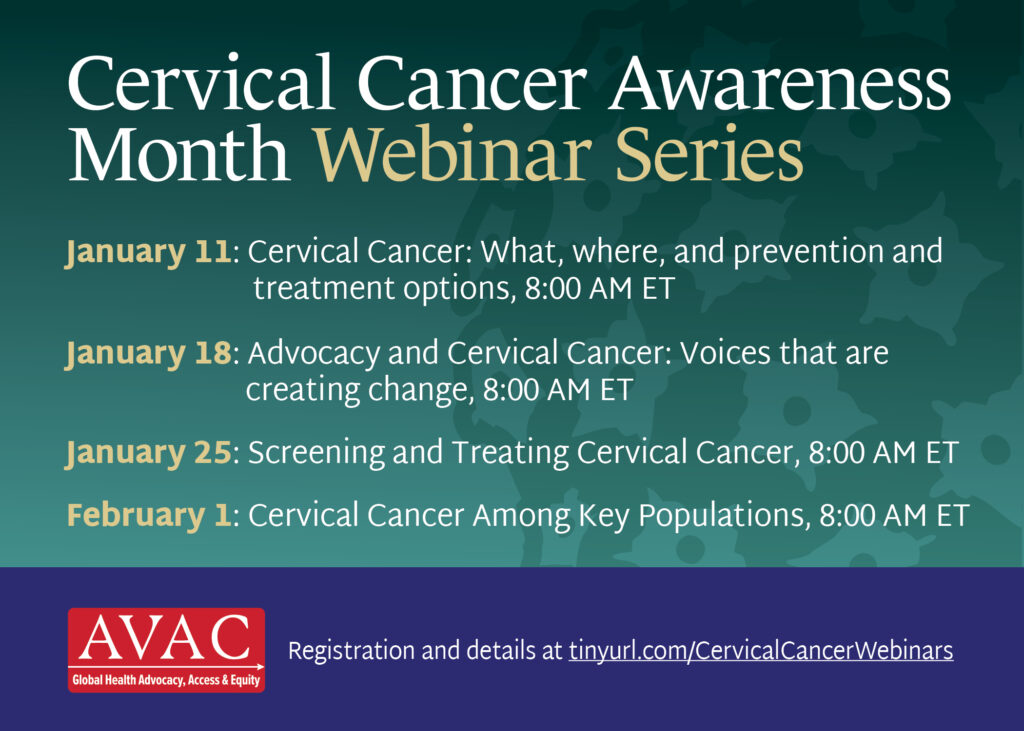
Cervical Cancer Awareness Month Webinar Series
Check out our 4-part webinar series on cervical cancer, which featured a deep dive on: what cervical cancer is, who is impacted, and prevention and treatment options; advocacy strategies to bring more attention to cervical cancer and its impact on communities; options for screening and treating cervical cancer along with ongoing research; and the impact of cervical cancer on key populations and those vulnerable to HIV infections. Recording, slides and resources.
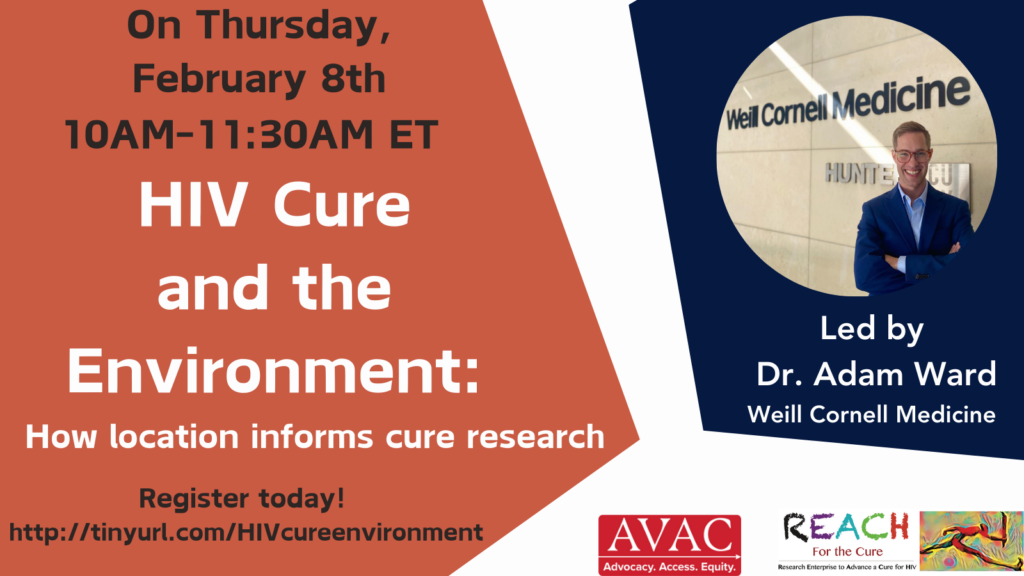
HIV Cure and the Environment: How location informs cure research
This webinar reviewed core concepts discussed in the previous webinar, Let’s Talk About HIV Cure Research: An Introduction to the science under investigation, and introduced how the environment may impact cure strategies. Recording, slides and resources.

Learn more about the townhall discussion on Black Gay Men and HIV in the US featuring influential figures in the Black Gay community, including Ace Robinson, Daniel D. Driffin, and Kenyon Farrow by checking out highlights on AVAC’s Twitter page and watch the full recording.
Thanks for checking out these conversations. We hope you will join us in these rich discussions and watch this space for future webinars!
New issue of POSITIVELY AWARE points the way towards a more equitable future
In many ways the world is entering an era of HIV prevention that many of us have spent the last 40 years fighting for— there now exists multiple options for preventing HIV that are safe, highly effective and easy to use. 2012 saw the introduction of the first ARV-based prevention option—daily oral PrEP. And over the past two years, WHO recommended, and several national regulatory agencies have approved, injectable ARVs for treatment and prevention, as well as the dapvirine vaginal ring.
While these advances are something to celebrate, this is far from the end of the road. Technological gains only go as far as people’s awareness of them, desire to use them, and access to them. And this is where we — as a public health community and as a planet of humans — struggle. Just like with the first ARV therapies in the mid 1990s, and the first PrEP pill for prevention a decade ago, we’re now four years into the FDA approval of the first long-acting ARV therapy and we are several years away from scaling up these long-acting medications and truly seeing the impact they can have on the lives of people (whether living with HIV or in need of PrEP), and on the HIV epidemic itself.
It takes the HIV response far too long to move these innovative inventions to the point where they become medical miracles, experienced by everyone who needs and wants them, regardless of race, ethnicity, national origin, religion, sexual orientation, gender identity, sex assigned at birth, pregnancy status or income.
There is a new special issue of the magazine POSITIVELY AWARE, co-edited by Kenyon Farrow, AVAC’s communications director, and Jim Pickett, AVAC’s senior advisor and lead of the Choice Agenda, that explores the impact of long-acting injectable treatment and PrEP. The articles, including a piece co-authored by John Meade, AVAC’s senior policy manager, and Danielle Campbell of PrEP in Black America and longtime AVAC partner, speak to the humans involved in downstream research, and what their experiences as patients, researchers, advocates and medical providers of long-acting treatment and PrEP teach us about how these products could be transformative. These stories make clear how far we still have to go to change our health systems so that they can meet their maximum potential.
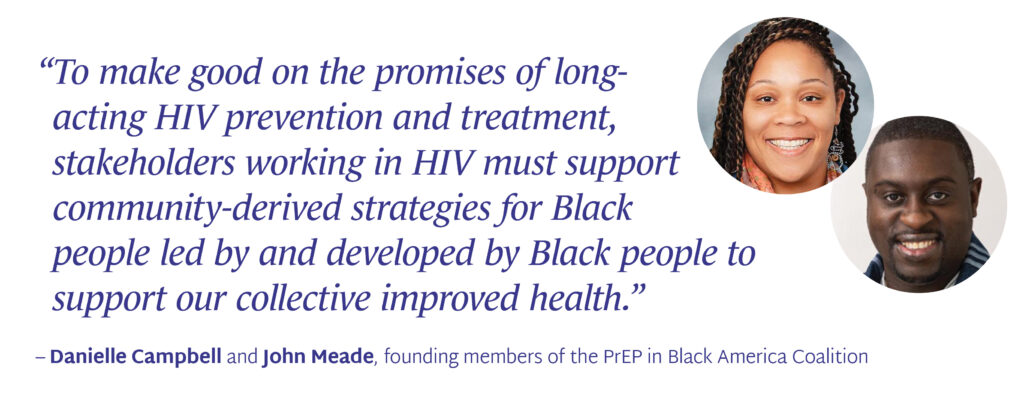
AVAC will continue our work to advocate for global equity in access to prevention and treatment in all their current and future forms. We celebrate this issue of POSITIVELY AWARE as one collection of voices helping to point the way towards a more equitable future.
Avac Event
AVAC in Conversation with NIAID’s Jeanne Marrazzo
The new director of National Institute of Allergy and Infectious Diseases (NIAID), Dr. Jeanne Marrazzo joined AVAC Executive Director in conversation.
Remembering a Legacy and Celebrating AVAC Fellow Alumni
For over a decade, the AVAC Advocacy Fellows Program has played a role in shaping the landscape of HIV prevention by strengthening leadership skills and building a growing and evolving network of fierce and unstoppable advocates. Last year, AVAC released A Legacy of Impact: The power and reach of AVAC’s Advocacy Fellows to tell the story of the Fellows program and to share testimonies of impact from research to policy, and beyond.
Today, on Martin Luther King Jr. Day, a day dedicated to the importance of advocacy to influence change, AVAC honors its nearly 100 Fellow alumni and applauds our most recent class which closed out their fellowship in December.
Read on for testimonies from the AVAC 2022/2023 Fellows and explore their work in their individual pages.
AVAC 2022/2023 Fellows in their words
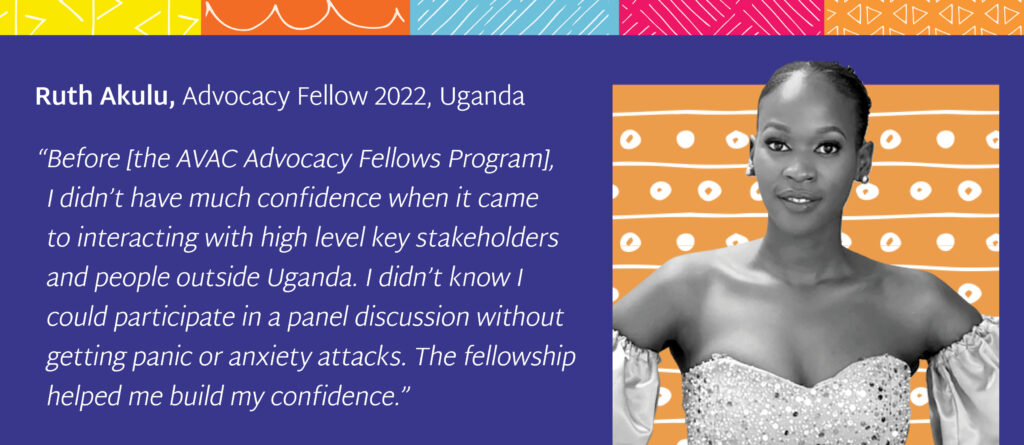
Learn about Ruth’s work around the approval and rollout of the dual prevention pill (DPP) in Uganda here.
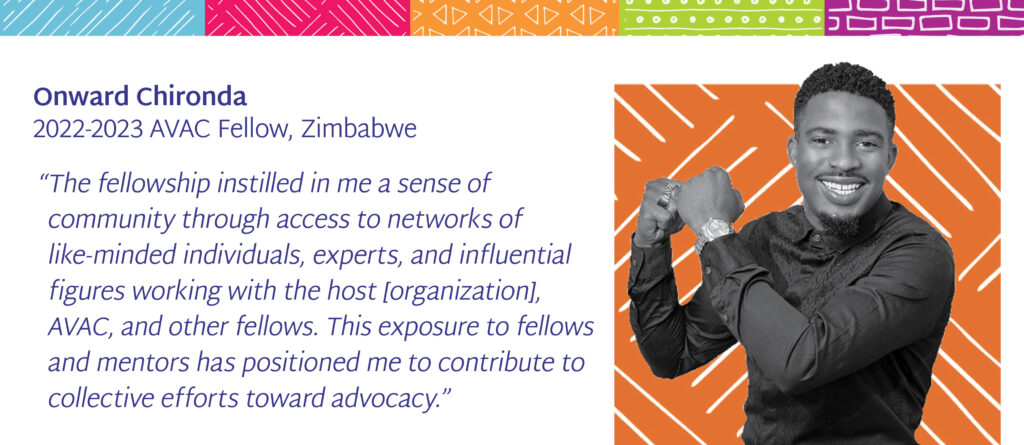
Learn about Onward’s work with engaging religious institutions on adolescent sexual and reproductive health in Zimbabwe here.
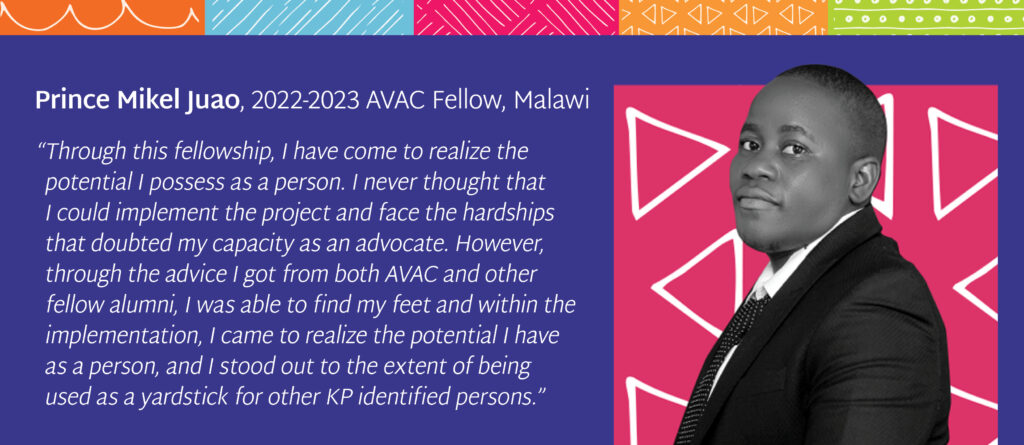
Learn about Prince’s work ensuring access to injectable CAB for PrEP for trans people in Malawi here.
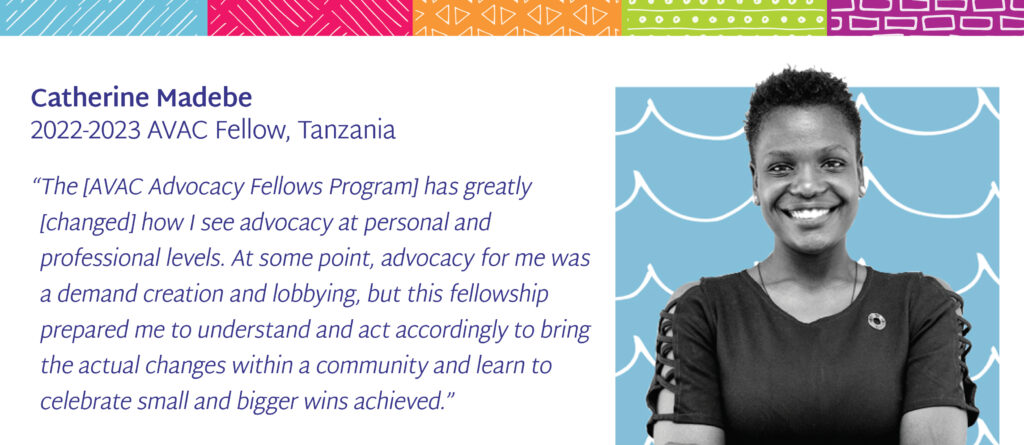
Learn about Catherine’s work in the rollout and implementation of the dapivirine vaginal ring for adolescents and young women (AGYW) in Tanzania here.
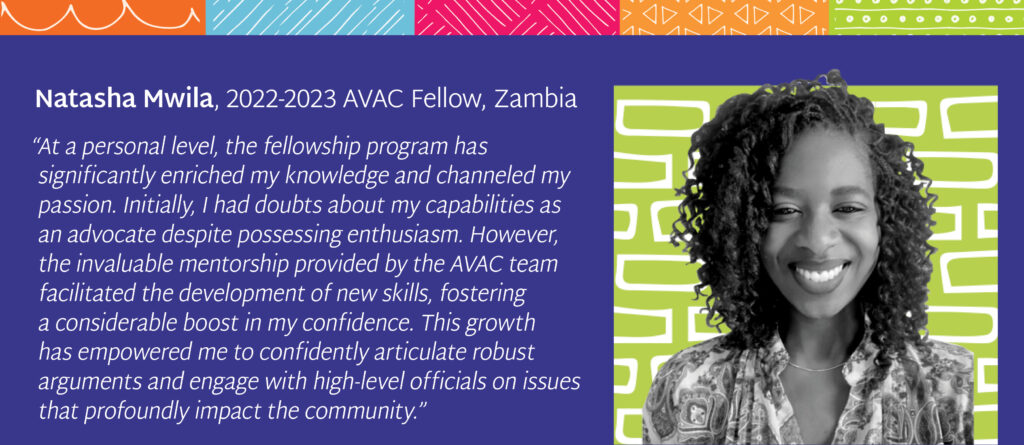
Learn about Natasha’s advocacy for the approval of the dapivirine vaginal ring and injectable CAB for PrEP in Zambia here.
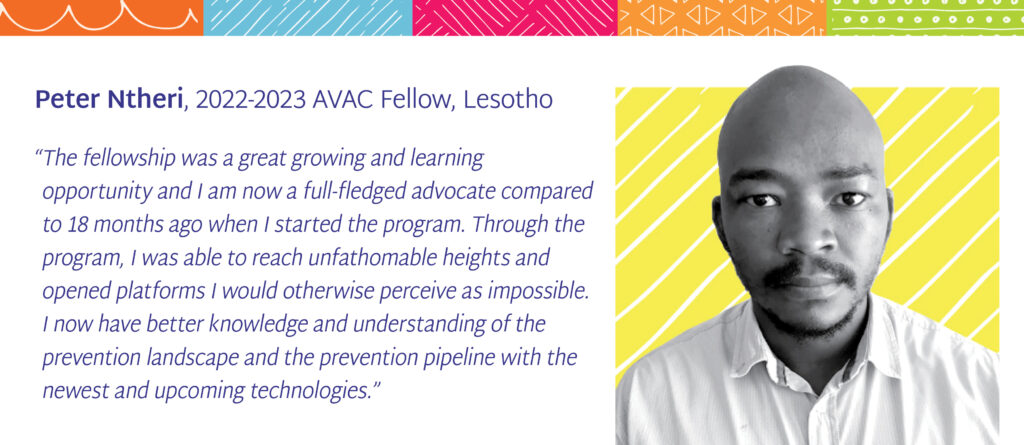
Learn about Peter’s work with differentiated service delivery of PrEP and expediting new PrEP tools in Lesotho here.
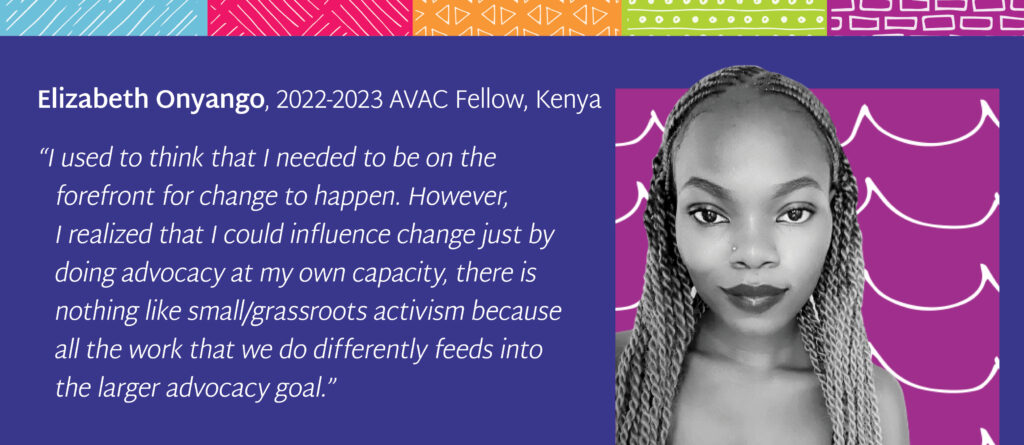
Learn about Elizabeth’s work advocating for sex workers and people who use drugs (PUD) here.
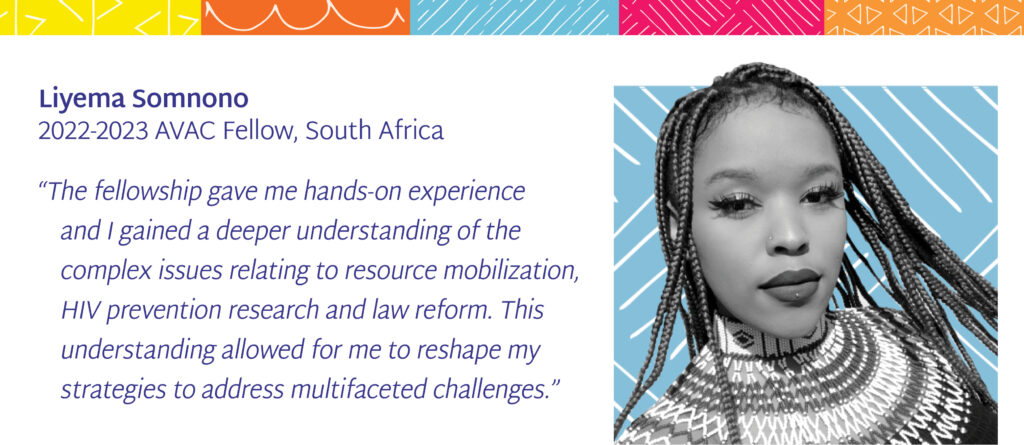
Learn about Liyema’s work on advocating and implementing the decriminalization of sex work in South Africa here.
Get to know the full AVAC Fellows community by exploring the full alumni database and stay tuned to meet the 2024/2025 class to be announced in April!
New Year, New PrEPWatch Resources
In 2024 we look forward to continuing to provide advocates with tools to support our collective work to ensure access to PrEP in all its forms to all who can benefit from it.
PrEPWatch.org has grown significantly in the past year, reaching a growing number of implementers, policy makers and advocates with continually updated tools and information that are instrumental to delivering the growing range of HIV prevention options. Throughout 2023, visitors from every country in the world have used PrEPWatch.org, a one-stop online clearinghouse of data, guidelines, tracking tools and other resources to help the global community speed the delivery of every proven method of PrEP to everyone who needs it. Check out what’s new and updated on PrEPWatch.org!
New on PrEPWatch

Modelling the Scale-Up of Injectable CAB for PrEP
Our Biomedical Prevention Implementation Collaborative (BioPIC) teamed up with the HIV Modelling Consortium to produce this analysis of the potential impact of scaling up injectable cabotegravir (CAB) for PrEP, What can modelling tell us about the scale-up of CAB for PrEP? The findings can help implementers and policymakers understand what to expect and guide early policy decisions to maximize the impact of CAB for PrEP on the HIV epidemic.
Country Pages
PrEPWatch has added 35 new country pages where you can find the status of drug registration for PrEP products, data on PrEP initiations by product, country-level PEPFAR targets, and links to key policy documents and guidelines.
The Integrated Study Dashboard
Produced under the BioPIC project, the Integrated Study Dashboard tracks all currently known activities relating to implementation research, modelling, clinical research, and landscaping for new biomedical HIV PrEP options, including CAB for PrEP and the dapivirine vaginal ring (DVR), and has been recently expanded to include links to study results and study websites. The dashboard is updated in real time, and links to results will be added as they become available.
More Essential Resources on PrEPWatch.org

Tracking Country Planning for Product Introduction
The Country Planning for Product Introduction Matrix tracks key indicators for the introduction of injectable CAB and the DVR by country, including regulatory status, late-stage clinical trials and implementation research, procurement plans, and recent oral PrEP provision.
Training PrEP Champions
Among the most popular resources on PrEPWatch, the HIV Prevention Ambassador Training Package and Toolkit prepares potential and current PrEP users to be leaders – and “Ambassadors” – in the rollout of PrEP for HIV prevention in their communities. Developed as part of the MOSAIC project, it includes a training manual and resources for Ambassadors to use in peer outreach and community education.
Trends in PrEP Initiations
The Global PrEP Tracker provides quarterly updates on global trends in PrEP initiation by geography, delivery models, and more. The Global PrEP Tracker has become an indispensable resource for following the state of the field in delivering PrEP.
We hope these tools, created through strong partnerships and joint effort, support your work to accelerate the delivery of HIV prevention options. We are always interested in collaboration to ensure needed resources are developed and up to date. If you have information to share or resource needs, please let us know by reaching out to [email protected] and [email protected].
Px Pulse: A season of listening
As we look ahead to 2024 and the vital work AVAC and partners will be carrying forward, the conversations from 2023 offer guidance and insights. Px Pulse, AVAC’s podcast on critical issues facing HIV prevention research, hosted several not-be-missed conversations in 2023 that will reverberate into the year ahead.
From a stalled PEPFAR reauthorization to LGBTQIA+ voices fighting persecution in Uganda; from efforts to bring equity to a new global architecture for pandemic readiness to advances in HIV vaccine science and advocacy to include pregnant people in research—we hope that all of these conversations can inform our advocacy in 2024. Click on the episode for both recordings and resources.
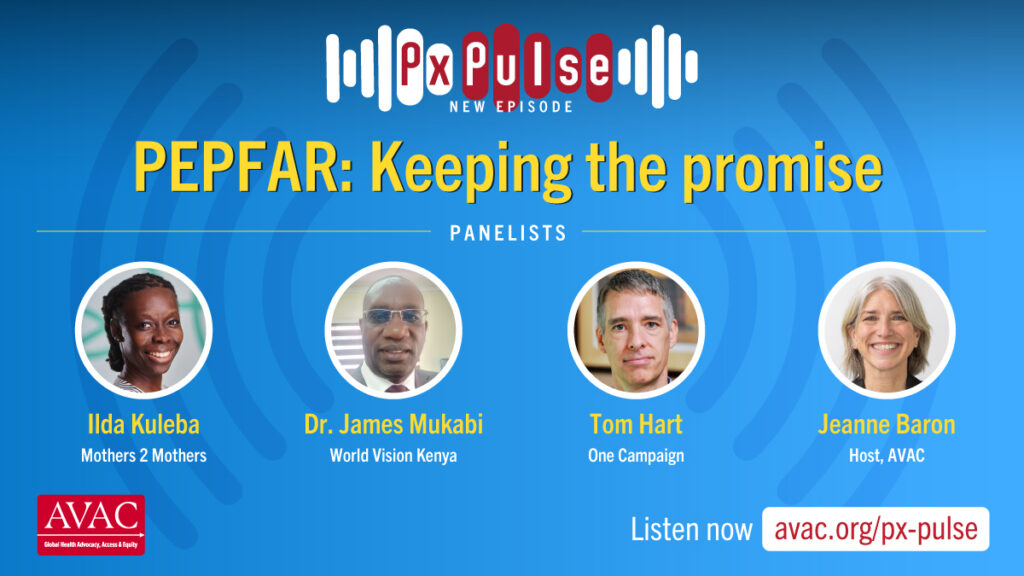
PEPFAR at 20: Keeping the promise (23:16)
Considered one of the greatest US foreign policy and global development achievements of the century, the program has saved upwards of 25 million lives since it launched in 2003. But PEPFAR is marking its 20th anniversary while fighting for its future. LISTEN HERE.
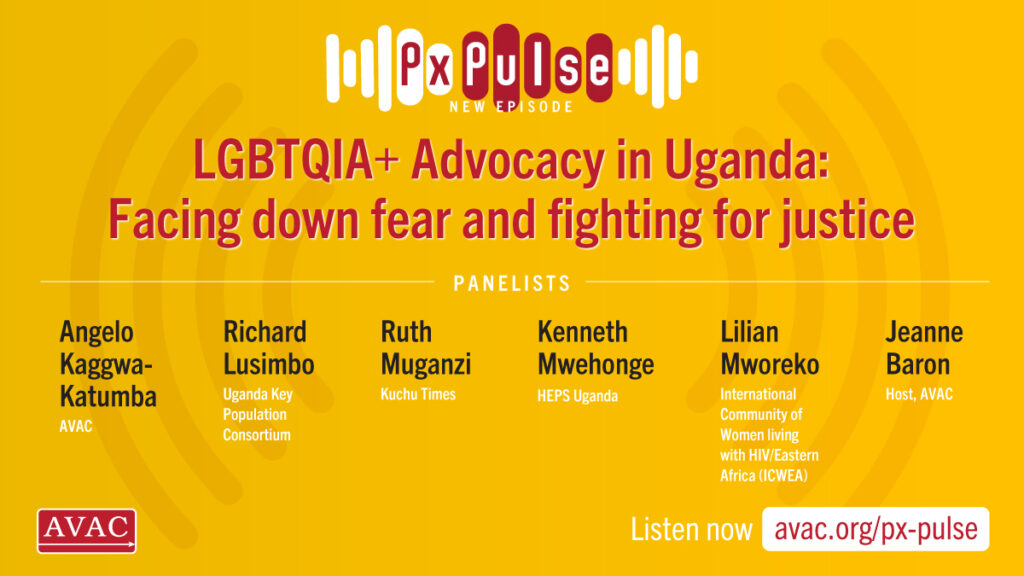
LGBTQIA+ Advocacy in Uganda: Facing down fear and fighting for justice (24:19)
In March 2023, the Ugandan Parliament moved forward broad-reaching legislation to further criminalize LGBTQIA+ people. This podcast features Ugandan advocates and AVAC partners discussing the specifics of how these attacks have gained momentum and their ties to US-based religious extremists. The advocates discuss what needs to happen next. LISTEN HERE.
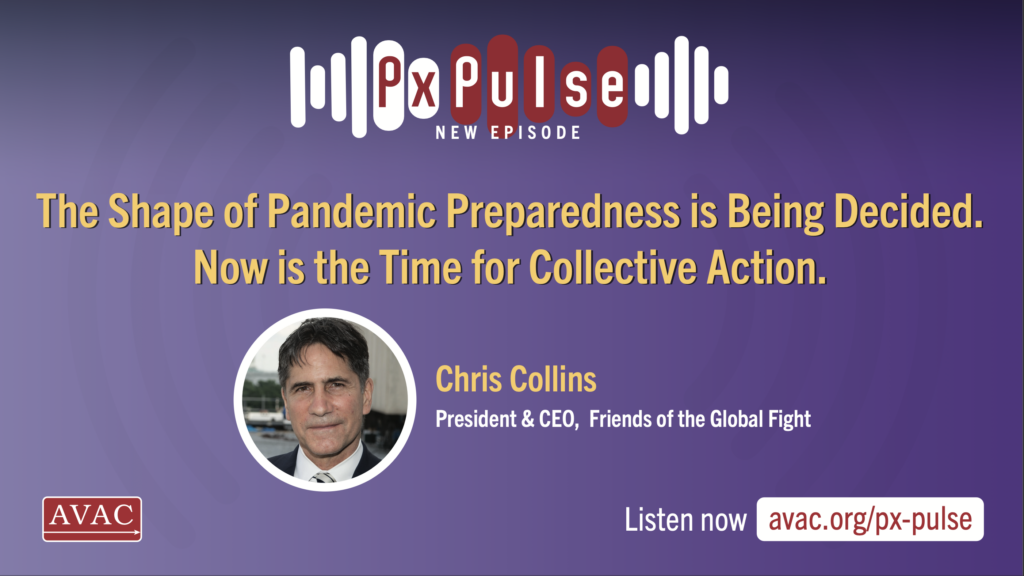
The Shape of Pandemic Preparedness is Being Decided. Now is the Time for Collective Action (15:14)
Health leaders around the world are in the midst of creating a new architecture to deal with pandemics. Chris Collins, the CEO and President at Friends of the Global Fight Against AIDS, Tuberculosis and Malaria, talks about what’s at stake, which policymakers get it already, why this year matters so much, and what advocates can do about it. LISTEN HERE.
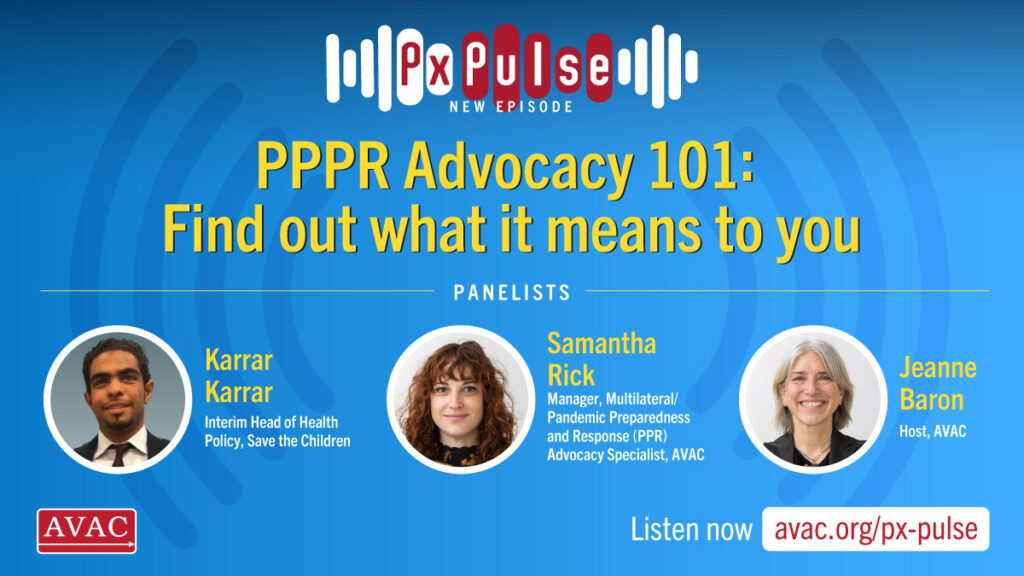
PPPR Advocacy 101: Find out what it means to you (19:05)
Over the coming months, global leaders will make key decisions about several initiatives to prepare for the next pandemic. This podcast explores what they commit to, how much they will spend and how well these plans safeguard equity. LISTEN HERE.
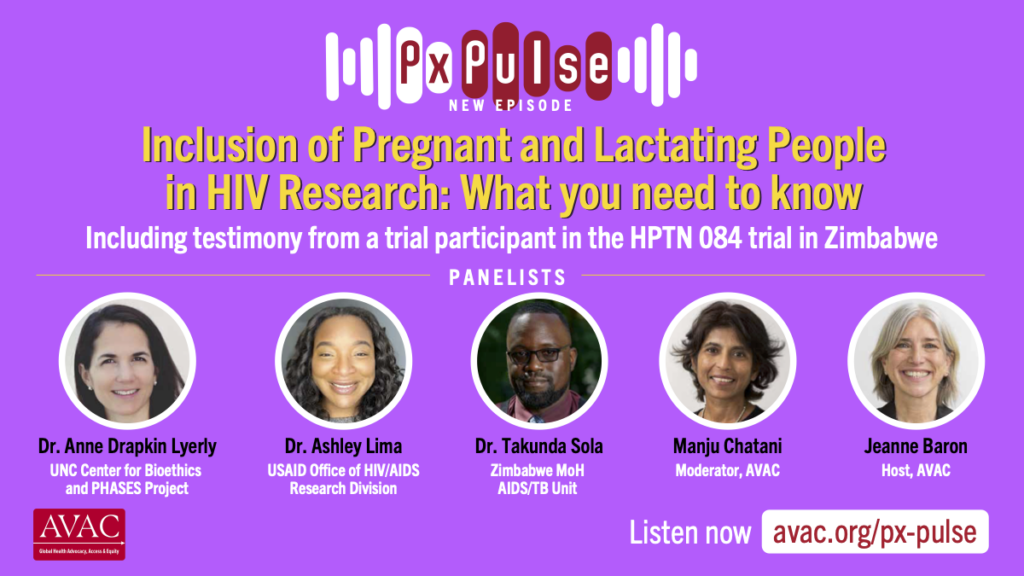
Inclusion of Pregnant and Lactating People in HIV Research: What you need to know (34:28)
AVAC’s Manju Chatani-Gada takes us through conversations with a trial participant who became pregnant, researchers, policymakers and donors to understand why this population gets excluded, the impact it has and what to do about it. LISTEN HERE.
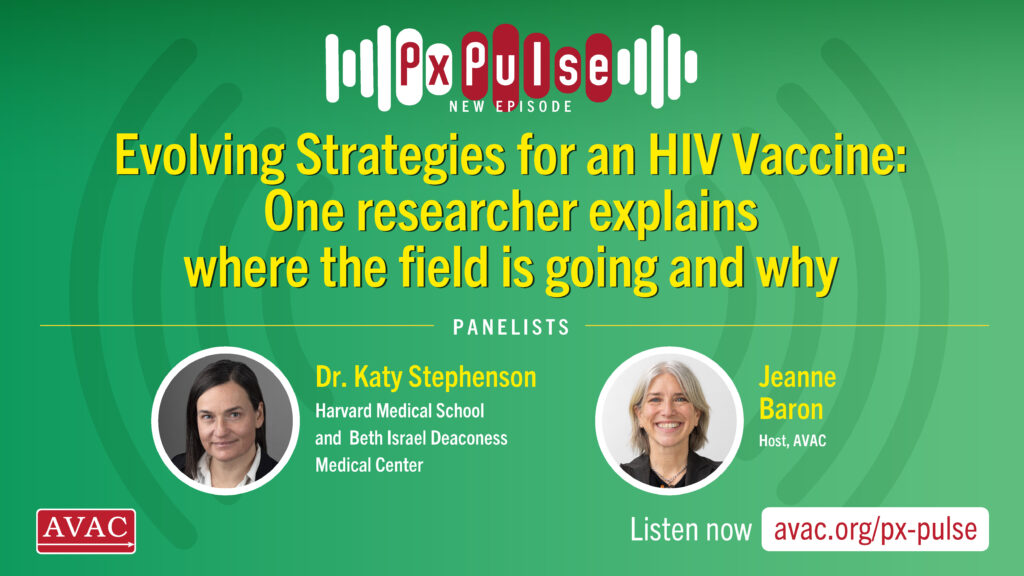
Evolving Strategies for an HIV Vaccine: One researcher explains where the field is going and why? (21:23)
Evolving Strategies for an HIV Vaccine: One researcher explains where the field is going and why? Dr. Katy Stephenson explores the implications of recent trial results, the big questions driving next generation vaccine development, and new strategies underway in early phase research. LISTEN HERE.
Happy listening—and let us know what topics you want to hear more about in 2024!
PxWire Volume 13, Issue No. 4
PxWire is AVAC’s quarterly update covering the latest in the field of biomedical HIV prevention research and development, implementation and advocacy. Each issue includes updates, emerging issues and upcoming events. Also available as a PDF.
From Research to Rollout: A look at where we are in HIV prevention

As we look back on 2023, powerful crosscurrents confront HIV prevention and global health equity. More options than ever before could be available, but many forces threaten to undermine access to proven prevention options that exist today and the development of additional options that are still needed. Threats to PEPFAR and hate laws targeting LBGTQI+ people are just a sample.
Upstream research and development is dynamic, but robust stakeholder engagement and sustainable funding must still be secured and integrated into a people-centered research agenda. These commitments are the compass that will ultimately lead to impact in the real world. The highlights below provide a snapshot of key updates in Q3 of 2023 and resources to inform advocacy on these critical questions.
Progress in PrEP Uptake
These updates from AVAC’s Global PrEP Tracker explore trends in 2023 and highlight new data as of September 2023.
PEPFAR and PrEP
PEPFAR’s role has been instrumental to accelerating global uptake of PrEP to date. This year, four countries started providing PrEP for the first time, and seven countries exceeded 70,000 new PrEP initiations, most of which are attributable to PEPFAR. This lifesaving, uniquely effective, program must see continued full funding and a 5-year reauthorization to carry on this work and help to put the world on track to control the epidemic.
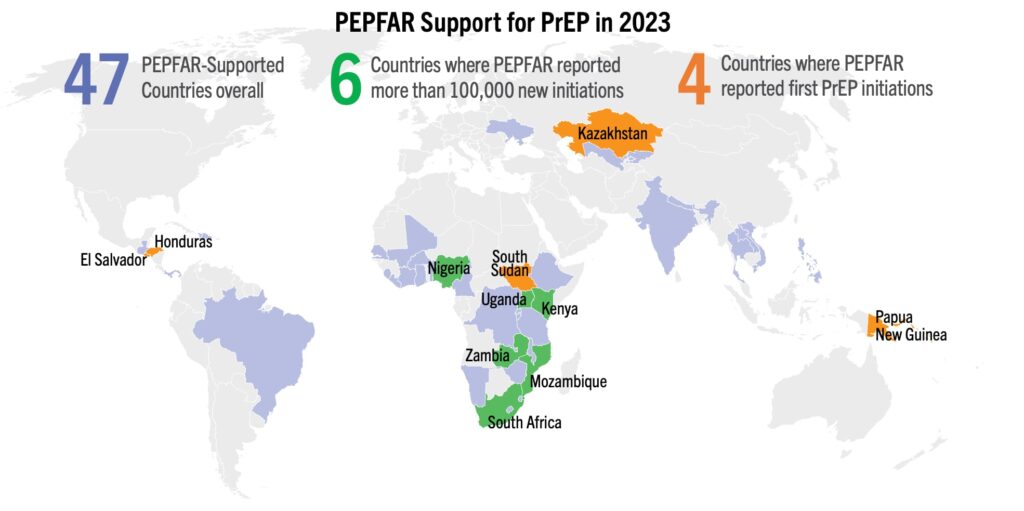
Cumulative PrEP Initiation Milestones
Global Milestones
- The world surpassed 5.6 million cumulative PrEP initiations as of September 2023. Initiations increased by 700,000+ since Q2 2023. Though comparable to previous quarterly increases, it is the highest ever recorded quarterly increase by the Global PrEP Tracker.
- At the same time last year the world had reached 3.3 million cumulative PrEP initiations, representing a doubling of initiations since then.
Country Level Milestones
- Early adopting African countries continue to show the most rapid increases in PrEP uptake. South Africa has shattered 1 million cumulative initiations. Nigeria, Uganda, and Zambia have all surpassed 500,000 initiations, Kenya has surpassed 400,000, and Zimbabwe has surpassed 200,000.
- Malawi and Brazil saw jumps of approximately 20,000 initiations over this quarter, while Lesotho had more modest increases of 10,000 initiations.
- Dozens of countries continue to grow their programs. For example, El Salvador, Honduras, and South Sudan all surpassed 1,000 cumulative initiations.
- Cyprus and Malta recorded their first oral PrEP initiations, at 29 and 579 respectively.
Spotlight on West Africa
As of Q3 2023, the top five West and Central African countries for PrEP initiation have surpassed 10,000 initiations; Cameroon, Cote d’Ivoire, Democratic Republic of the Congo (DRC), Ghana and Nigeria. Nigeria has marked almost 550,000 cumulative initiations as of this quarter, ranking it second, behind South Africa, worldwide. These milestones can be credited to targeted PEPFAR investments. But despite these successes, West and Central Africa make up only 14 percent of PrEP initiations recorded in Africa, compared to 85 percent reported by East and Southern Africa. These same countries are home to two thirds of all people living with HIV in West Africa. There is vital work to be done to close the gap.
West and Central Africa can and must continue to leverage this recent growth in oral PrEP by making additional HIV prevention options available. In September, Nigeria’s regulators approved injectable cabotegravir (CAB for PrEP)—approving the first new biomedical HIV prevention option in a West and Central African country since oral PrEP. But at this time, only one other CAB for PrEP application has been submitted in the region, in Côte d’Ivoire, and none for the dapivirine vaginal ring (DVR). Only one CAB for PrEP implementation study is planned for the region.
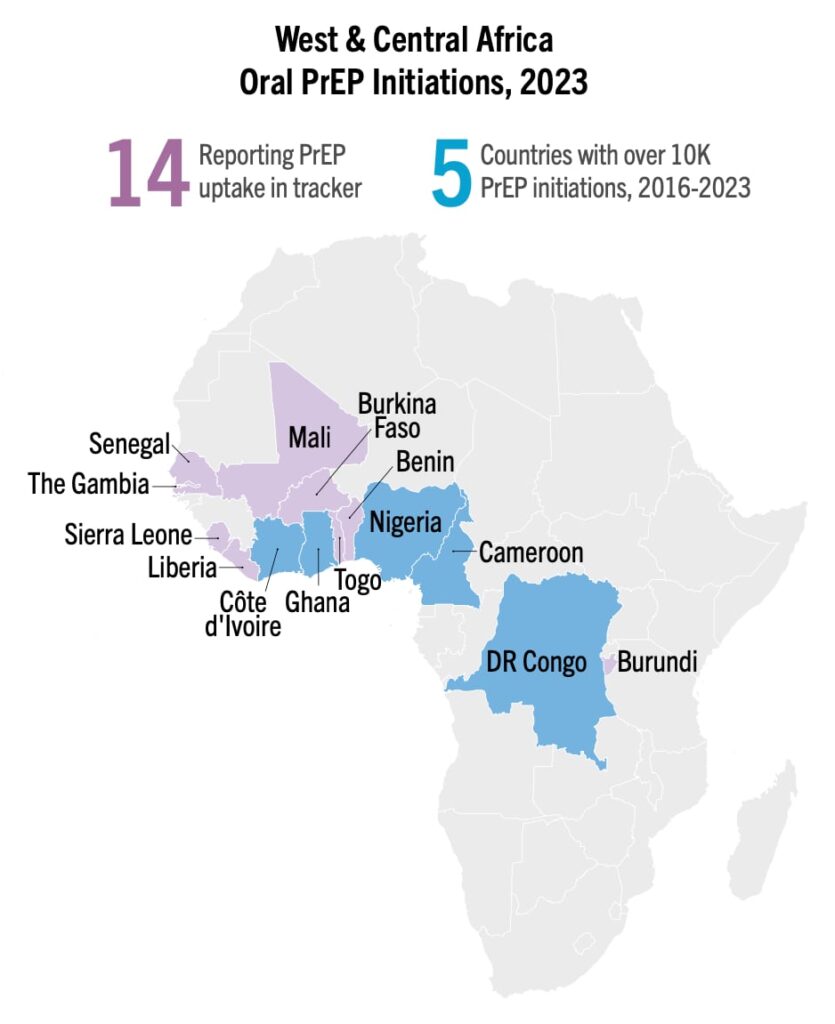
PrEParing for New Products
Current HIV prevention options aren’t reaching all who need them. Access to a range of options that meet the needs of diverse people, especially those most at risk, will be essential to meeting global targets for ending the HIV epidemic.
- CAB for PrEP Supply: In October 2023, ViiV, the developer and sole manufacturer of CAB for PrEP for now, announced a 40 percent increase in forecasted doses that could be available for non-commercial use in low- and middle-income countries through 2025, an increase to 1.2 million potential doses. Of these, 116,000 have been allocated to post-trial access for HPTN 083 and 084 participants; 129,000 for an initial set of eight implementation studies; 326,000 to PEPFAR programs in Malawi, Ukraine, Vietnam, Zambia and Zimbabwe; leaving at least 629,000 doses available for procurement by PEPFAR, Global Fund and national governments. See more details in our Country Planning Matrix. Three generic manufacturers could begin to deliver doses in 2026 or 2027.
- Implementation Science (IS): As DVR and CAB for PrEP supplies arrive in countries, dozens of implementation science studies are underway in 22 different countries. Check out AVAC’s Integrated Study Dashboard for more details and stay tuned for updates.
- PrEParing for Choice: For the first time since oral PrEP was introduced in 2012, PrEP users will have a range of methods to choose from—but only if they have access to them. Policy makers, donors, governments and implementers must commit to making these methods available, accessible and affordable. The HIV Prevention Choice Manifesto, launched in September by the African Women’s HIV Prevention Community Accountability Board, outlines what needs to happen to make choice a reality.
Approval Information
- Malaysia, Nigeria, Peru, Zambia, and the European Medicines Agency have approved CAB for PrEP; ViiV also made submissions in Canada, Colombia, and the United Kingdom. There are now 13 regulatory approvals and 15 additional submissions that are pending.
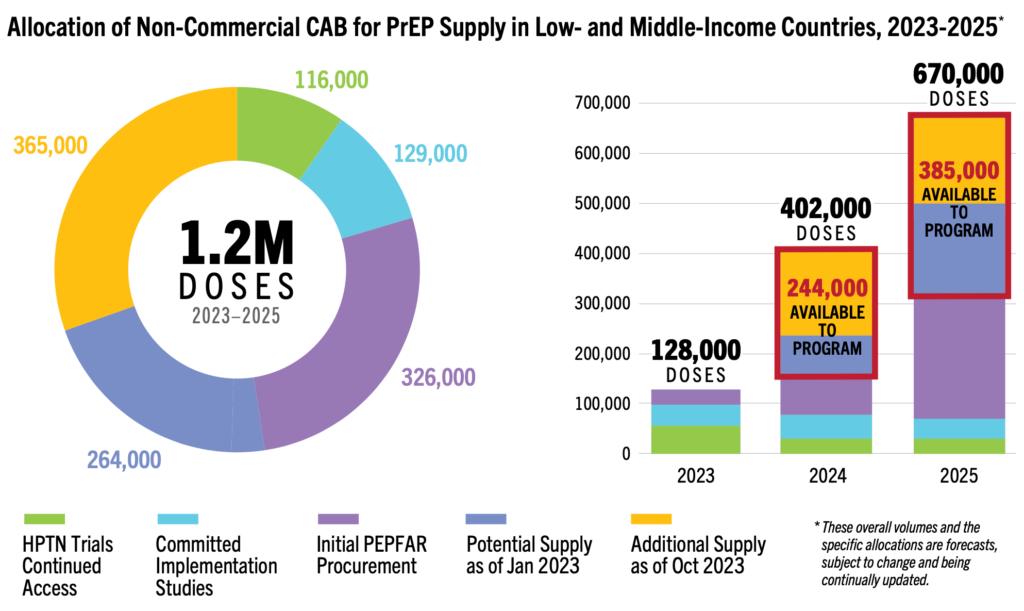
The HIV Prevention Pipeline: The latest in research, development and more
The HIV prevention pipeline has evolved: Few products are in late stage or efficacy trials, newly proven products are rolling out, and early phase clinical trials are exploring innovative strategies. R&D is focused on ARV and non-ARV based prevention products and HIV vaccines that build on new knowledge about the virus. The late-stage trials of recent years and basic science have brought deepening insights that are being applied today to a diversity of ‘upstream’ interventions.
- MK-8527 Announced: Merck announced a new Phase 2a trial to evaluate the safety, tolerability, and pharmacokinetics of a monthly oral pill, MK-8527. The trial began in November 2023 in participants at low-risk for HIV acquisition. If successful, Phase 3 trials could start in 2025.
- PURPOSE Program: A new Phase 2 study, PURPOSE 5, will evaluate lenacapavir as a twice-yearly prevention option in France and the United Kingdom, as part of the larger PURPOSE program. Purpose 5 is recruiting participants who are disproportionally affected and often underrepresented in HIV clinical trials. PURPOSE 1 and 2 are Phase 3 efficacy studies in Argentina, Brazil, Mexico South Africa, Thailand, Uganda and the United States. PURPOSE 3 & 4 are smaller studies focused on populations facing disproportionate risk.
- The Dual Prevention Pill (DPP): In September, the DPP, which would protect against pregnancy and HIV, moved to the next stage in R&D. A pilot bioequivalence study has shown the pill’s combined drugs—an antiretroviral and a contraceptive—are absorbed at an equivalent rate as taking them separately. The DPP now moves to a larger bioequivalence study needed for a regulatory submission. Check out the updated DPP Market Preparation and Introduction Strategy for highlights. The Population Council and Medicines360 are also developing a second-generation DPP with F/TAF.
Prevention Playlist
The most effective advocacy is based on smart analysis and accurate information. AVAC develops a wide range of materials and resources to inform decision making and action. Check out these essential resources to the global conversation on HIV prevention and global health equity.
JOIN
- ICASA: The biennial International Conference on AIDS and Sexually Transmitted Infections in Africa. Dec 4-9. Register
- How Our Environment Impacts Cure, webinar, Dec 13. Register
- Sex, Gender & HIV Cure Research, Dec 6. Register
READ
- Progress Against HIV and AIDS is Fragile, article
- STI Watch Newsletter, a curated resource on the latest STI vaccines, diagnostics and other prevention strategies.
- The STI Clinical Trials Dashboard, tracking trials on vaccines, doxycycline as post-exposure prophylaxis (DoxyPEP) and diagnostics against chlamydia, gonorrhea, hepatitis B, herpes simplex virus(HSV), human papillomavirus, syphilis and trichomoniasis infections.
- Paving the Road for STI Prevention Advocacy, blog
- Three HLMs, A Host of Challenges and One Major Victory, blog
- A Legacy of Impact: The power and reach of AVAC’s Fellows, report
- Advancing Choice in HIV Prevention Research, blog
- Adherence, Safety and Choice, Lancet article on MTN 034 offering DVR and oral PrEP to African women
- How ‘unauthorized status’ is threatening US global HIV initiative, article
- The GPP Body of Evidence, online clearinghouse
- From The Lab to The Jab, issue briefs
- Bending the Curve: What a decade-long rollout-out of the anti-HIV pill can teach the world, article
WATCH AND LISTEN
- The anti-HIV Jab is Coming to SA. Find Out When and How, podcast
- Spotlight on new PrEP tools & data, from R&D to access, webinar
- Africa Health R&D Week, webinar series
- Pandemic Accord Briefing for Civil Society, webinar
- PrEP Resources Showcase, workshop
- Let’s Talk HIV Research: An introduction to the science under investigation, webinar
- HPTN 096: Building Equity Through Advocacy—An integrated status-neutral approach for ending the epidemic among Black gay men in the South, webinar
- Inclusion of Pregnant and Lactating People in HIV Research: What you need to know, podcast
- Results from STI Landscaping Analyses in East and Southern Africa—Part 1 & Part 2, webinar
- Pioneering Self-care Solutions to Drive Access to HIV Prevention and Family Planning, webinar
- Boo, Syphilis is Really Back!, webinar
- Practicality over Panic: What happens if PEPFAR isn’t reauthorized?, webinar
- Foundations of HIV Cure Research, webinar
- PEPFAR at 20: Keeping the promise, podcast